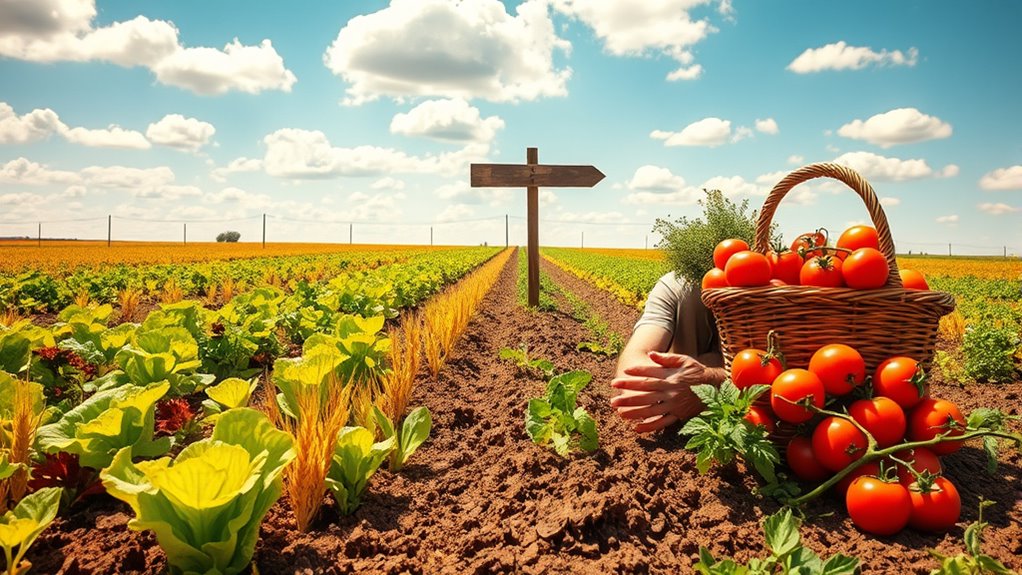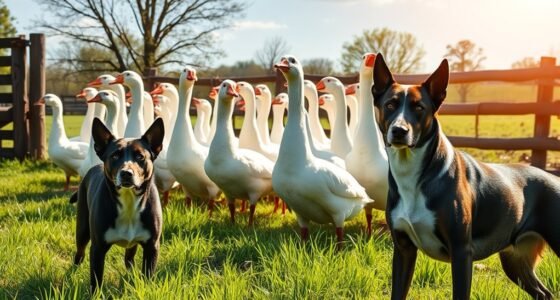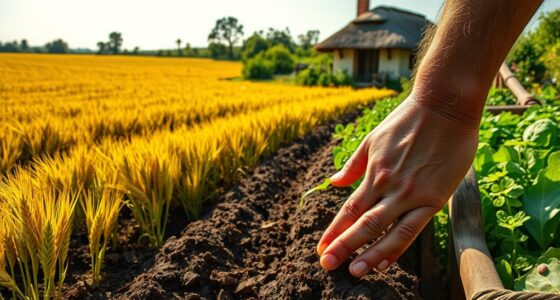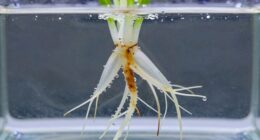Organic farming is all about using natural methods to grow crops without synthetic chemicals. It focuses on practices like crop rotation, composting, and biological pest control to enhance soil health and support biodiversity. By prioritizing these eco-friendly techniques, organic farming reduces pollution and promotes sustainable agriculture. It also helps farmers earn premium prices for their products. If you're curious about the principles, methods, and challenges of organic farming, there's plenty more to discover!
Key Takeaways
- "O Farming" typically refers to organic farming, which emphasizes natural methods over synthetic inputs for agricultural production.
- Organic farming prioritizes techniques like crop rotation, cover cropping, and biological pest control to maintain soil health and biodiversity.
- It avoids harmful pesticides and fertilizers, promoting cleaner soil and water while enhancing the well-being of ecosystems.
- Certification for organic farming requires adherence to strict regulatory standards, ensuring products meet organic quality criteria.
- While organic farming can yield lower outputs and incur higher costs, it often allows for premium pricing on products, benefiting farmers economically.
Understanding Organic Farming

Understanding organic farming means recognizing an agricultural approach that prioritizes natural methods over synthetic inputs. This system emphasizes techniques like crop rotation, green manures, and biological pest control to promote soil health and biodiversity.
When you choose organic farming, you're opting for practices that avoid harmful pesticides and fertilizers, significantly reducing pollution and conserving natural resources. To be certified as organic, farms must adhere to strict regulatory standards, ensuring they comply with these eco-friendly practices.
Additionally, organic farming often supports local economies by providing premium prices for organic products, making it not just a sustainable choice but also an economically beneficial one. By embracing organic methods, you contribute to a healthier planet and community. Furthermore, organic farming practices can lead to higher enzyme content in crops, which may enhance their nutritional value.
Key Principles of Organic Agriculture
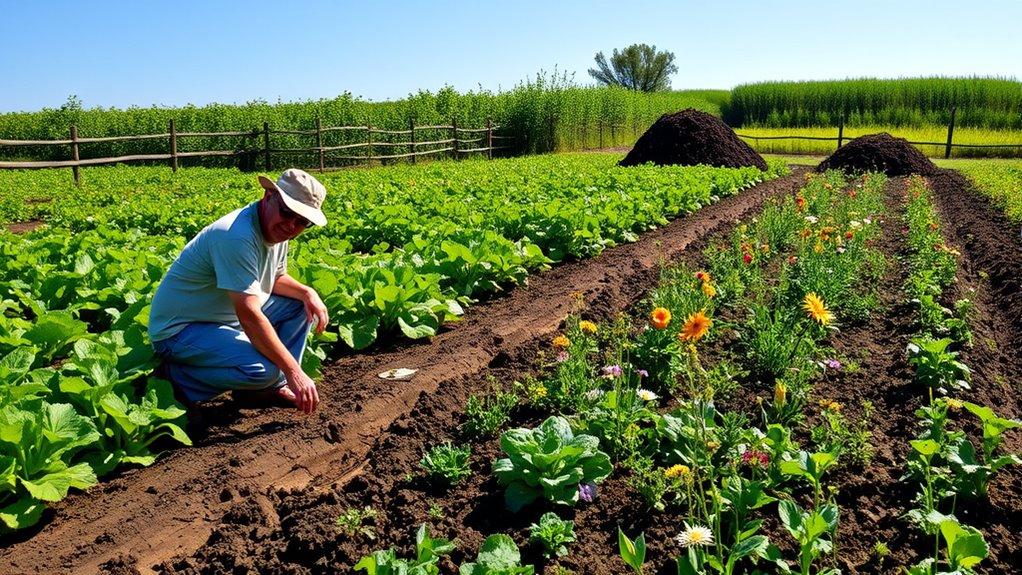
Organic agriculture is built on a foundation of key principles that guide sustainable farming practices.
The Principle of Health emphasizes enhancing the well-being of soil, plants, animals, and humans.
The Principle of Health prioritizes the vitality of soil, plants, animals, and humans for a thriving ecosystem.
Next, the Principle of Ecology focuses on sustaining natural systems and cycles.
Additionally, the Principle of Fairness promotes equitable relationships among stakeholders and supports community welfare.
The Principle of Care ensures that farming practices protect the environment for future generations.
Together, these principles encourage global adoption of organic methods, fostering soil health, biodiversity preservation, and resource conservation.
Common Organic Farming Methods

When you embrace organic farming methods, you're not just following trends; you're adopting practices that enhance soil health and promote biodiversity.
Crop rotation helps you prevent pest infestations and boost soil fertility by changing crop species seasonally. Cover cropping reduces erosion while improving soil quality. Incorporating green manures and animal manures enriches the soil with nutrients.
To manage weeds without chemicals, integrated weed management combines physical and biological techniques. Composting and mulching keep your soil moist and suppress weeds.
Crop diversification and polyculture foster ecological balance. For pest control, you can rely on biological methods, physical barriers, and organic pesticides.
Each method you adopt contributes to a more sustainable farming environment, ensuring the health of your crops and the ecosystem.
Advantages of Organic Farming

Embracing organic farming methods not only benefits the environment but also offers a range of advantages that resonate with both farmers and consumers.
You'll notice reduced chemical use, which leads to cleaner soil and water. Plus, organic practices improve soil health, enhancing its structure and fertility while conserving water. By supporting biodiversity, organic farms create a richer ecosystem and often incorporate advanced filtration systems to further protect the environment.
On the health front, you can enjoy nutrient-rich produce with fewer pesticide residues and higher antioxidant levels. Economically, organic products often command premium prices, benefiting farmers financially.
Additionally, these methods foster community engagement and promote sustainable lifestyles. Ultimately, choosing organic farming contributes to climate change mitigation through lower greenhouse gas emissions and better carbon storage. Moreover, organic farming practices align well with solar energy solutions, providing an eco-friendly approach to agricultural productivity.
Challenges Faced by Organic Farmers

While many appreciate the benefits of organic farming, you'll find that farmers face significant challenges in this approach. One major hurdle is lower yields, often around 25% less than conventional methods.
Farmers embracing organic practices often struggle with lower yields, typically seeing a decrease of around 25% compared to conventional farming.
You'll also notice yield variability due to pests and weather, making your harvest unpredictable. Managing soil fertility without synthetic fertilizers requires meticulous care, and crop rotation can be labor-intensive.
Economically, higher production costs and expensive certification processes can strain your budget. Plus, breaking into mainstream markets can limit your sales opportunities.
You'll encounter regulatory complexities and varying organic standards across regions, adding to the confusion. Lastly, pest and weed management often demands more time and effort, further complicating your farming journey.
Comparing Organic and Conventional Farming
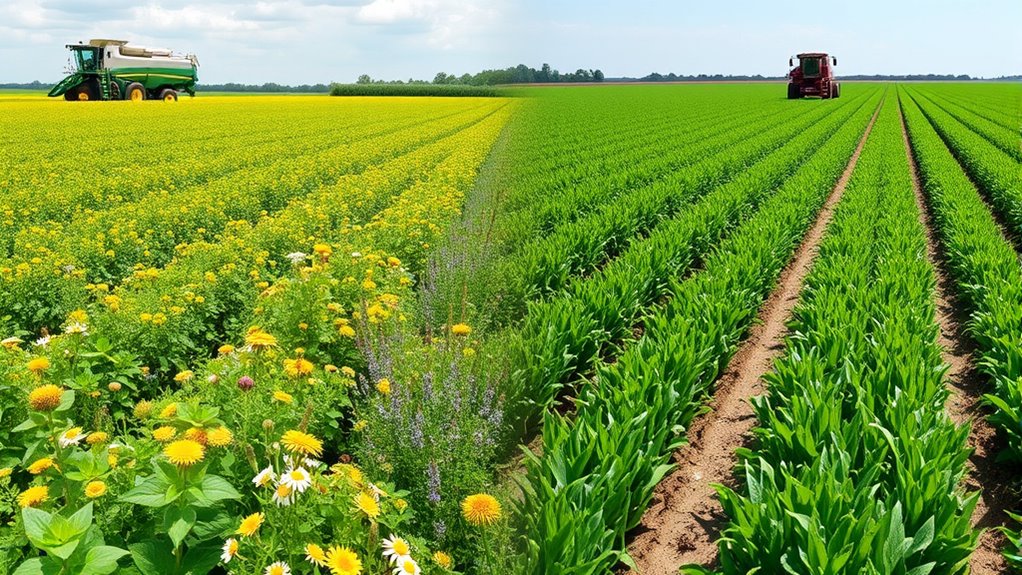
Organic and conventional farming represent two distinct approaches to agriculture, each with its own set of practices and philosophies.
You'll find that organic farming emphasizes natural inputs, focusing on soil health and biodiversity through methods like crop rotation and biological pest control.
On the other hand, conventional farming relies heavily on synthetic fertilizers and pesticides, often using monocultures for efficiency.
While organic practices enhance environmental sustainability, conventional methods typically support large-scale production.
Organic farming also prioritizes animal welfare, prohibiting antibiotics, unlike its conventional counterpart.
Additionally, organic farming usually requires more land for similar yields, but the growing consumer demand for organic products signals a shift towards more sustainable agricultural options.
The Future of Organic Farming

As consumer demand for healthier and more sustainable food options rises, the future of organic farming looks promising.
The global organic food market is projected to hit $546.97 billion by 2032, with a significant growth rate of 10% over the next decade. Innovations like precision agriculture and AI are enhancing productivity while addressing environmental concerns.
Organic farming methods prioritize sustainability, improving soil health and promoting biodiversity. Investment in research and development is crucial, enabling farmers to adopt cutting-edge technologies.
Governments also support organic farming through initiatives aimed at increasing production. With a focus on healthier food and environmental benefits, organic farming is set to thrive, meeting the needs of conscious consumers and fostering a sustainable future.
How to Get Certified Organic
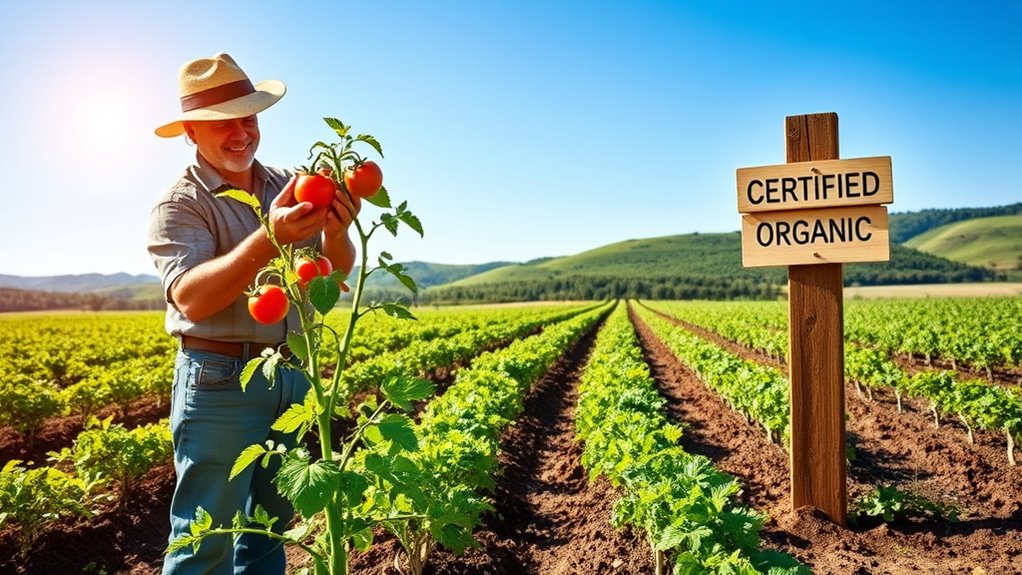
Getting certified organic is a vital step if you want to tap into the growing market for organic products.
Start by developing an Organic System Plan that outlines how you'll comply with USDA regulations. Once that's in place, implement your plan and have it reviewed by a certifying agent.
An on-site inspection will follow to verify your compliance. After reviewing the inspection report, if everything checks out, you'll receive your organic certificate.
Frequently Asked Questions
What Distinguishes Organic Farming From Regenerative Farming?
When you compare organic farming to regenerative farming, you'll notice some key distinctions.
Organic farming strictly prohibits synthetic inputs and follows established certification standards. In contrast, regenerative farming focuses on improving soil health and may allow limited synthetic use.
While organic emphasizes preventing damage, regenerative seeks to heal existing issues. Both prioritize soil health, but regenerative farming places a stronger emphasis on carbon sequestration and overall ecosystem restoration.
Can Organic Farming Be Practiced in Urban Areas?
Imagine stepping outside your apartment and picking fresh tomatoes from your rooftop garden. Yes, you can absolutely practice organic farming in urban areas!
By utilizing creative spaces like rooftops, balconies, and community gardens, you can grow healthy, pesticide-free produce. Not only does it enhance your living environment, but it also fosters community ties and contributes to a sustainable food system.
Embrace the challenge, and transform your urban space into an organic oasis!
How Do Organic Farmers Handle Extreme Weather Conditions?
Organic farmers handle extreme weather by enhancing soil health and employing diverse practices.
They rotate crops to boost soil fertility and use cover crops to improve water retention. During droughts, you'll notice that organic fields often yield more due to better moisture management.
Additionally, organic soils absorb rainfall more efficiently, reducing flood risks. By adopting techniques like drip irrigation, you conserve water and minimize the impact of unpredictable weather events on your crops.
Are There Specific Crops That Are Better Suited for Organic Farming?
Imagine your garden as a symphony, where each crop plays its part. For organic farming, nitrogen-fixing legumes like clover and alfalfa enrich the soil, while cereals like rye control erosion.
Brassicas act as the pest warriors, releasing natural defenses. You'll find that diverse ecosystems thrive through polyculture, enhancing resilience.
What Role Do Consumers Play in Supporting Organic Farming?
You play a crucial role in supporting organic farming. By choosing organic products, you help drive demand for sustainable practices and encourage farmers to adopt eco-friendly methods.
Your preference for brands that prioritize transparency and environmental responsibility influences market trends. Additionally, by advocating for policy changes and participating in community initiatives, you promote awareness and collective action, ensuring a healthier planet and fostering a vibrant organic farming community.
Your choices truly matter!
Conclusion
In conclusion, organic farming offers a sustainable alternative to conventional methods, prioritizing ecological balance and health. Did you know that organic farms can support up to 30% more biodiversity than conventional ones? This statistic highlights the vital role organic practices play in preserving our environment. As you consider your food choices, remember that supporting organic farming not only benefits your health but also contributes to a healthier planet. Embrace the future of agriculture—every little choice counts!

